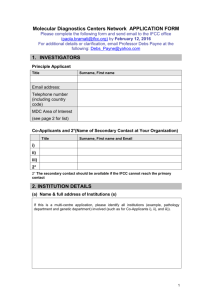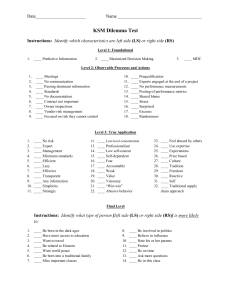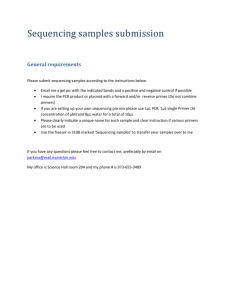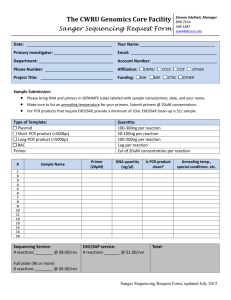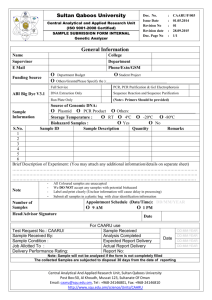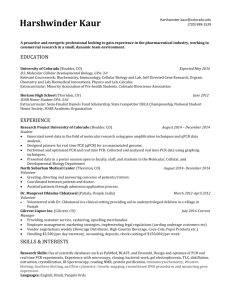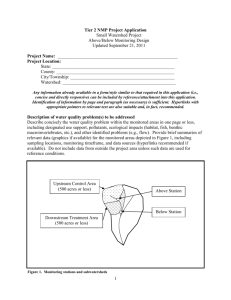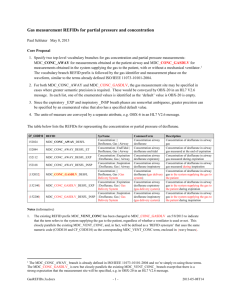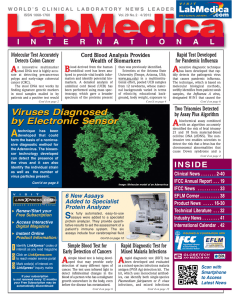Molecular Diagnostics Expert APPLICATION FORM
advertisement
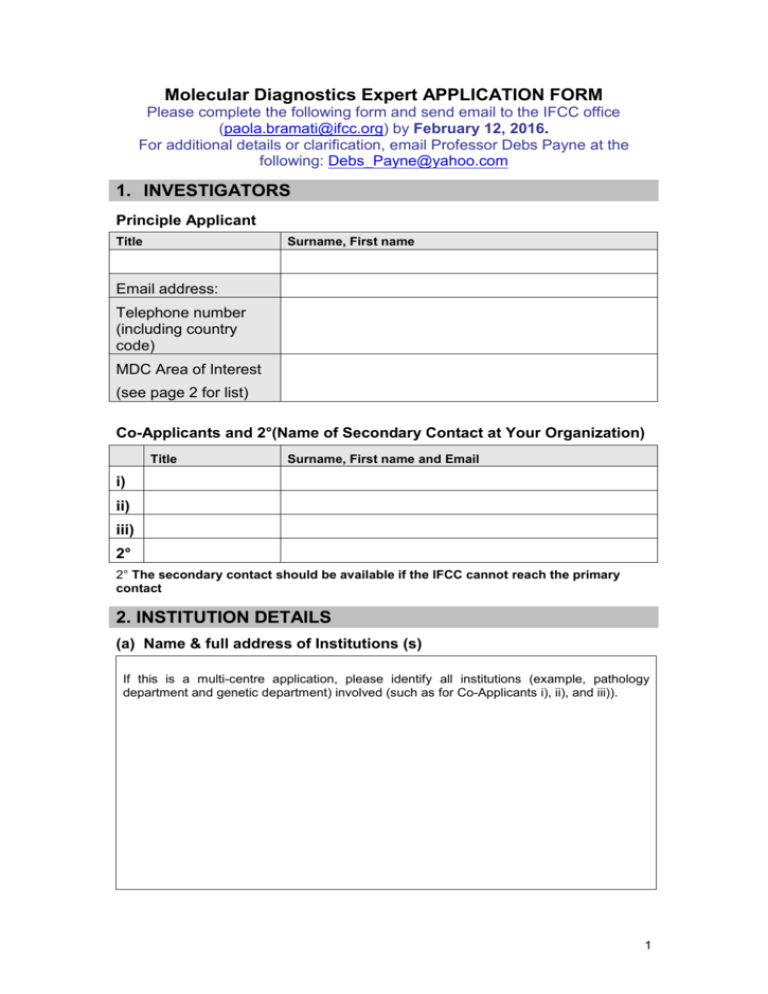
Molecular Diagnostics Expert APPLICATION FORM Please complete the following form and send email to the IFCC office (paola.bramati@ifcc.org) by February 12, 2016. For additional details or clarification, email Professor Debs Payne at the following: Debs_Payne@yahoo.com 1. INVESTIGATORS Principle Applicant Title Surname, First name Email address: Telephone number (including country code) MDC Area of Interest (see page 2 for list) Co-Applicants and 2°(Name of Secondary Contact at Your Organization) Title Surname, First name and Email i) ii) iii) 2° 2° The secondary contact should be available if the IFCC cannot reach the primary contact 2. INSTITUTION DETAILS (a) Name & full address of Institutions (s) If this is a multi-centre application, please identify all institutions (example, pathology department and genetic department) involved (such as for Co-Applicants i), ii), and iii)). 1 3. DETAILS OF THE PRINCIPLE APPLICANT Correspondence relating to this application will be sent to the Principle Applicant (i) Title (ii) Current Appointment: (iii) Institution: Given Name Surname Department: Postal Address: Courier Address: (if different to postal address) Telephone: Facsimile: Email: Alternate Email*: *An alternate email is necessary if the principle contact cannot be reached using the first email 4. LEVELS OF PARTICIPATION This section is for information only Participation as an IFCC MDC Expert Laboratory Objective: to act as a point of reference within a special area of interest within the general membership and member societies of IFCC. These laboratories will be recognized as an IFCC MDC Expert Laboratory. Laboratories may participate or show leadership in one or more of the following areas within a special area of interest, such as: Offer expert advice on the conduct and interpretation of molecular diagnostic tests. Act as a point of reference for analysis of difficult samples. Assay optimization. Provision of reference samples or sample exchange for alternate assessment Provision of sequence data to better characterize disease loci. Offer Expertise on genotype/phenotype correlations. Participate in development of reference methods. Participate in evaluation of new methodologies. Participate in the organization of Workshops, Training Courses Participate in translational research Support translation of guidance documents into different non English languages 2 5. MDC AREA OF INTEREST Examples Single-Gene Disorders Hemochromatosis, Fragile X, Cystic Fibrosis, Factor V Leiden Multi-Gene Disorders Dyslipidemias Oncology Solid Organ: Breast, colon, lungs, prognostic testing, therapeutic response Specific Area Hematological: Bcr-Abl quantitative PCR, B and T cell clonality, etc. Pharmacogenetics CYP2D6, TPMT Inherited Errors of metabolism glycogen storage disease, phenylketonuria, porphyria, Lesch-Nyhan syndrome Infectious Diseases Sexually transmitted diseases, Respiratory, Meningitis/Encephalitis, Hepatitis, Gastrointestinal Diseases, tropical diseases, Drug resistance, pediatric diseases Noninvasive prenatal testing, prognostic testing, therapeutic response Circulating cell free DNA, Circulating Tumor Cells Bioinformatics and Laboratory information systems Education Massively parallel sequencing data analysis, patient management algorithms, instrument interfacing User education i.e. website, health care provider (example, nurse and doctor education), Laboratory and workflow design Other(s) (specify): 3 6. LABORATORY DETAILS 6.a Accreditation Status Place an “X” against Yes or No Do you have accreditation status for performance of molecular diagnostic tests? Yes No Type of Accreditation: Type of accreditation (i.e. ISO 17025, ISO 15195..) 6.b Proficiency Testing Place an “X” against Yes or No Do you participate in any external quality assurance or proficiency testing schemes? Yes No Name of external quality assurance or proficiency testing schemes: 6.c Select the setting which best describes your group. Scheme(s) name: Place an “X” next to your selection Academic Government/State Hospital Laboratory Government/State Pathology Laboratory Private Hospital Laboratory Private Pathology Laboratory Other (specify) 4 6.d Basic Infrastructure And Sample Analysis Sample numbers and sample types. Number of samples analysed Number of samples per month Sample types analysed Blood Other including buccal swab, saliva, tissue (please state the specific sample type) Liquid based cytology Microbiological media b) What technologies are currently being employed for by your laboratory in clinical practice? Rank the top three by placing a number by the method (example, real time quantitative PCR(1), Non PCR based amplifications (2) and gel electrophoresis (3)) Place an “X” next to your selection DNA sequencing (Sanger) Restriction enzyme analysis of PCR products Real-Time PCR (Quantitative) Real-Time PCR (Genotyping) DNA sequencing (massively parallel) Gel electrophoresis dHPLC Non PCR based amplification methods (example, SDA, TMA, etc) Southern Blotting Circulating cancer cells In house Bioinformatics Circulating cell free DNA Massively Parallel Sequencing (also known as NGS) Mass Spectrometry Linkage analysis using microsatellites or other markers. DNA chip or microarray Other Techniques 5 6.e Participation in national or international studies or societies or relevant projects. If applicable, cite areas of national and international collaboration in the area of interest (please limit to this one page highlighting areas of greatest importance and relevance). 6 6.f Publications List if any, publications (max 10) you have in the area of interest, relevant to molecular diagnostics. 7 ADDENDUM. The criteria for recognition of an IFCC MDC expert laboratory will be based on: - Scientific excellence (score up to 20) based on the data reported in the section 7.f: Publications (max 10) - Availability of suitable Technological Infrastructures (score up to 20) based on the data reported in the sections 7.a: Accreditation status; 7.b: Proficiency Testing and 7.d: Basic Infrastructure and Sample analysis - − The potential capacity of dissemination (score up to 10) based on geographical distribution (max 1 MDC per country for each Area of Interest) and on the data reported in the section 7.e: Participation in National or international studies, or Societies The laboratories that will be selected to act as an IFCC MDC Expert Laboratory must sign, before acceptance, that their activities will be coordinated by the C-MD as follows: These items can be directly performed by an IFCC MDC Expert Laboratory (however they should be recorded for reporting to the C-MD) I Offer expert advice on the conduct and interpretation of molecular diagnostic tests. Act as a point of reference for analysis of difficult samples. Offer Expertise on genotype/phenotype correlations. Submit case report annually ONLY after a specific request from the C-MD such as: Assay optimization. Provision of reference samples. Provision of sequence data to better characterize disease loci. Participate in development of reference methods and/or materials. Participate in evaluation of new methodologies. Participate in the organization of Workshops, Training Courses 8
